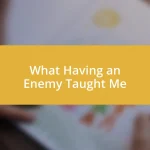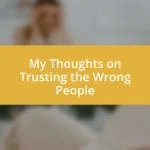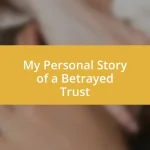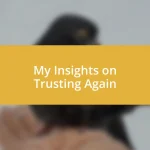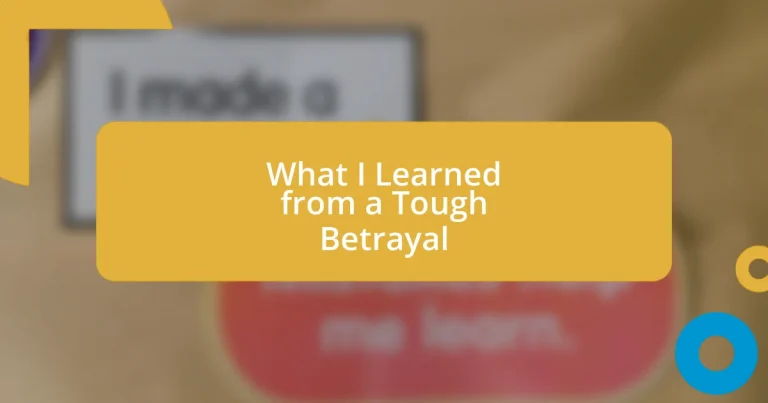Key takeaways:
- Understanding betrayal involves recognizing emotional impacts that can affect trust and lead to self-reflection and isolation.
- Processing emotions through journaling and self-compassion is essential for healing and regaining clarity after experiencing betrayal.
- Applying lessons from betrayal, such as setting boundaries and discerning trust, helps create healthier future relationships grounded in respect and personal growth.
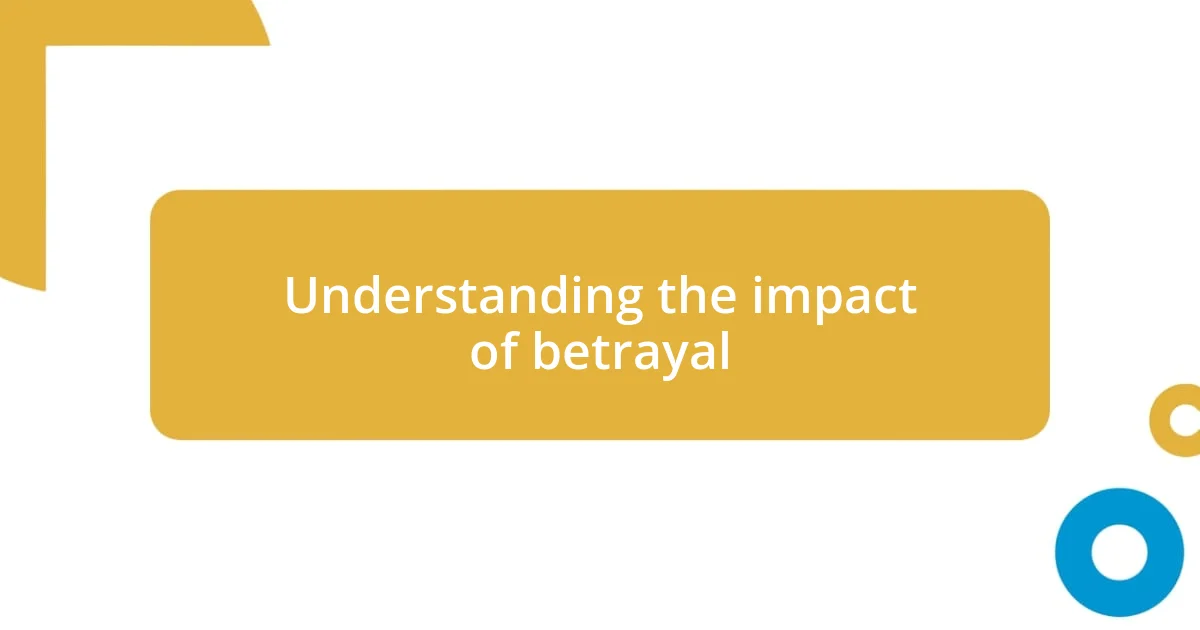
Understanding the impact of betrayal
Betrayal can shake the very foundation of our trust, often leaving lasting scars. I remember feeling a sharp pang in my stomach when I discovered that a close friend had shared my personal struggles with others. How could someone I confided in turn my vulnerability into gossip? That feeling of disbelief and hurt made me question not just that friendship, but my ability to trust anyone again.
The emotional fallout from betrayal is profound; it can lead to feelings of isolation and self-doubt. After my experience, I found myself replaying moments of our friendship, searching for clues that I missed. I often wondered, why do we invest so much in relationships only to watch them crumble unexpectedly? It took time to realize that it’s not only about the act itself but how it forces us to confront our inner vulnerabilities.
Understanding betrayal also means acknowledging its effect on our future relationships. The walls I built around myself became higher, a protective measure against another potential heartbreak. Have you ever felt that urge to hold back after feeling let down? It’s part of the healing process, but it shouldn’t define our ability to connect with others in the long run. Analyzing these feelings helps me navigate my emotional responses and ultimately move toward rebuilding trust.
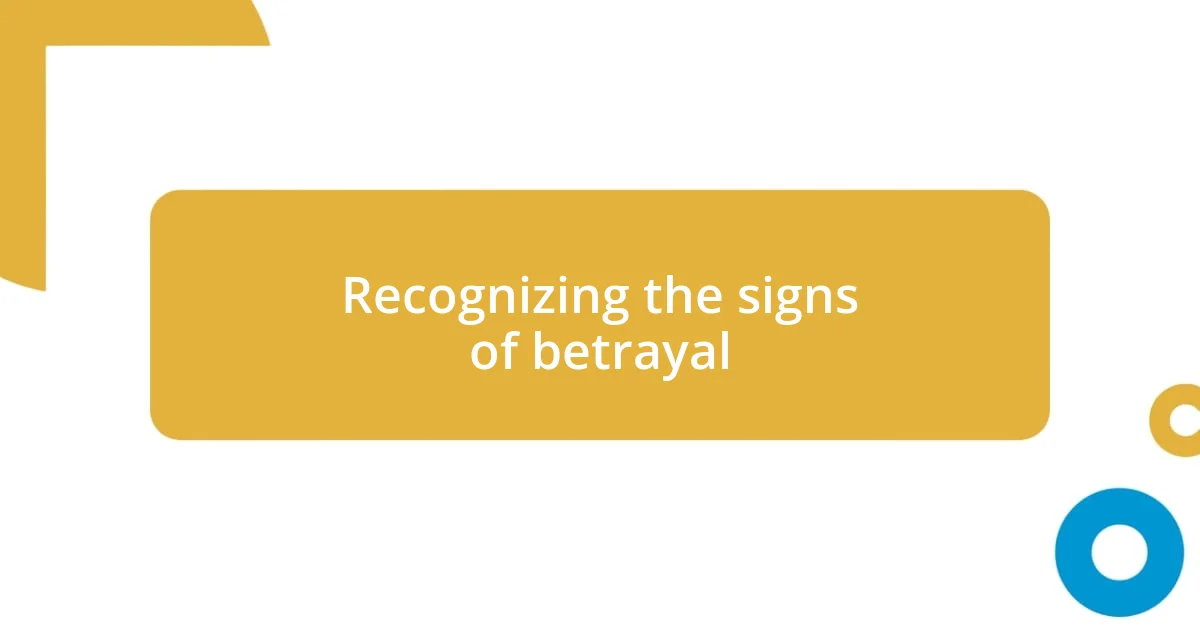
Recognizing the signs of betrayal
Recognizing betrayal can be a subtle yet powerful process. Often, I found that smaller, seemingly insignificant changes in behavior often foreshadowed more profound issues. For instance, when a friend began to sidestep my invitations or became evasive about their plans, it felt unsettling. These changes didn’t scream betrayal, but rather whispered it, nudging me to look closer at what was happening beneath the surface.
Here are some signs that may indicate betrayal is brewing:
- A noticeable decrease in communication and engagement.
- Increased secrecy or reluctance to share details about their life.
- Changes in body language, such as avoiding eye contact or closed-off postures.
- Frequent excuses that feel rehearsed or insincere.
- Sudden alignment with people I felt uncomfortable about, causing a gut reaction.
Acknowledging these signs can be tricky, especially when emotions cloud our judgment. I wish I had paid more attention when I felt those initial twinges of doubt. Sometimes, I realize, our instincts are our best guides.
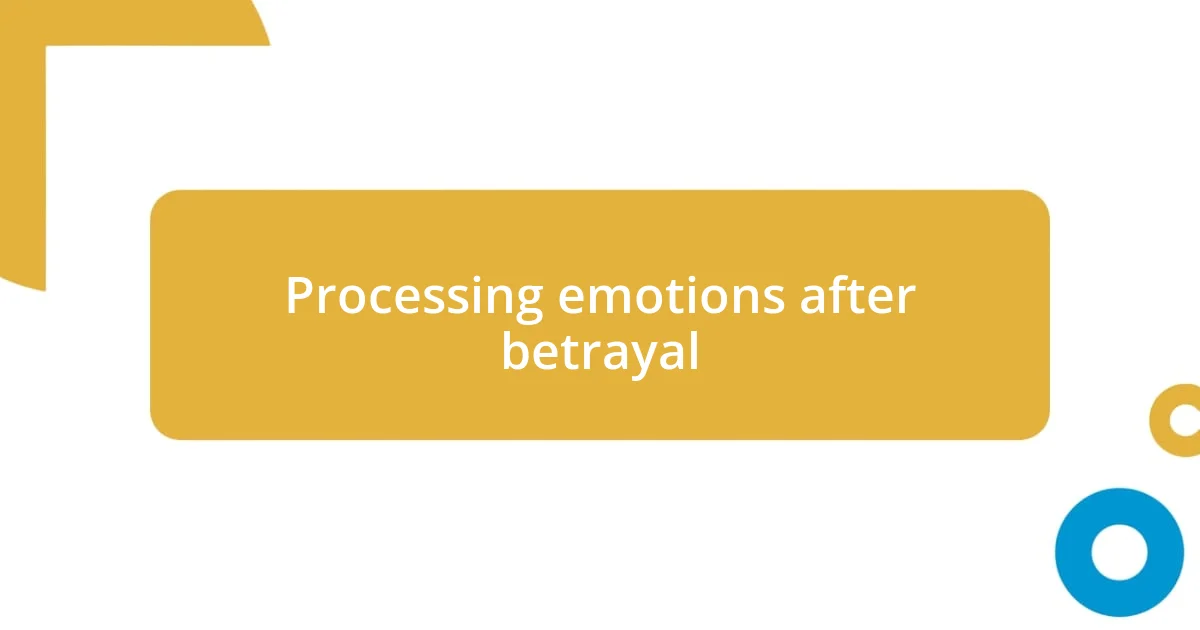
Processing emotions after betrayal
Processing emotions after betrayal involves understanding the depth of your feelings. I remember standing in my living room, grappling with waves of confusion, anger, and sadness. It’s strange how betrayal can alter your emotional landscape; one moment you’re feeling secure, and the next, you’re adrift. It’s like being on a rollercoaster that you never wanted to ride.
As I navigated my emotions, I discovered the importance of allowing myself to feel. I found solace in journaling about my experiences, which helped me articulate my pain and confusion. This practice not only provided clarity but also served as a therapeutic outlet. Have you ever tried writing down what you’re feeling? It can offer surprising insights and help you make sense of the turmoil inside.
Ultimately, healing from betrayal is a journey that takes time and self-compassion. I learned to embrace the discomfort rather than suppress it. Instead of rushing to forgive, I sat with my feelings and allowed the healing process to unfold naturally. Each step, even the painful ones, became a defining part of my growth. How do you approach your emotional healing? Remember, processing isn’t linear—it’s a winding path that leads to deeper self-awareness.
| Processing Emotions | Strategies |
|---|---|
| Awareness | Recognizing and acknowledging your feelings |
| Journaling | Writing down emotions to find clarity |
| Self-Compassion | Practicing patience with your emotional healing |
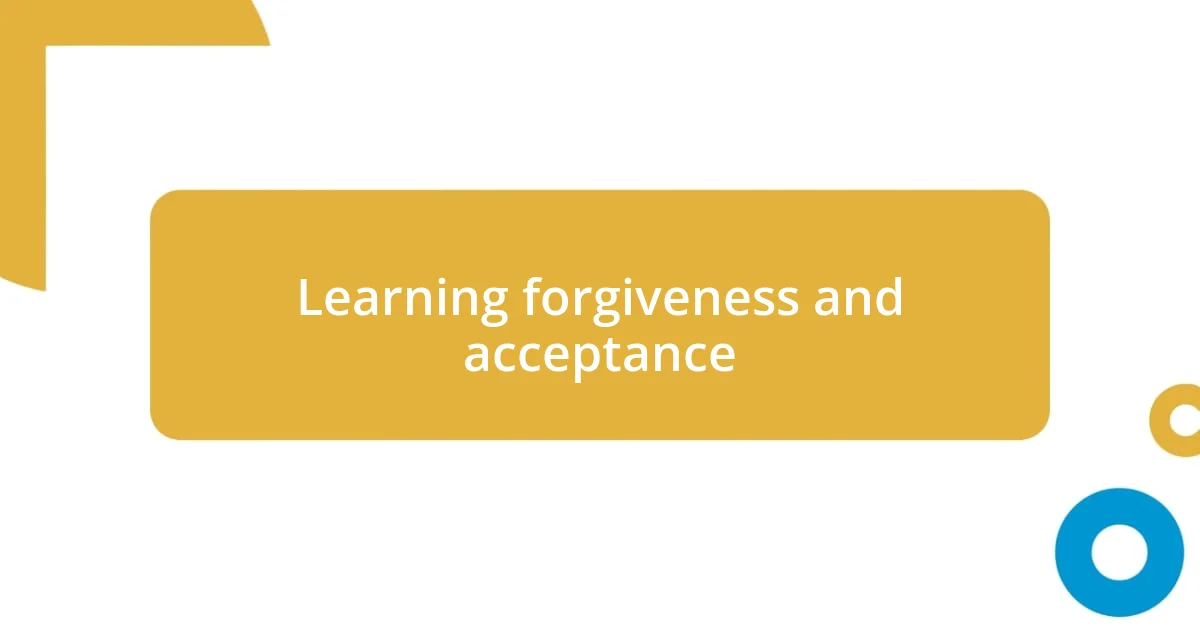
Learning forgiveness and acceptance
Learning to forgive is often a challenging but essential part of the healing process. I remember grappling with whether I could ever let go of the hurt someone caused me. There was a moment, after much reflection, when I realized that holding onto that pain was only weighing me down. Have you ever found yourself in that spot? It seems counterintuitive, but through forgiveness, I discovered a sense of liberation that I hadn’t anticipated.
Acceptance followed gradually, sneaking in like a soft breeze on a sweltering day. I recall sitting quietly, sipping my tea, and acknowledging my feelings without judgment. Instead of wishing things had gone differently, I learned to embrace the situation as it was. Accepting what happened didn’t mean condoning it; rather, it allowed me to release the grip that resentment had on my soul. Have you ever tried this? It brings a certain peace when you accept that some things are beyond your control.
In my experience, forgiveness and acceptance go hand in hand, creating a beautiful balance. As I began to forgive, I noticed a shift in my perspective; I could view the situation more objectively. It was as if a fog lifted, allowing clarity to break through. I realized that by forgiving, I was not just freeing the other person but, more importantly, liberating myself. How often do we forget the power lies within us to reclaim our happiness? Embracing this truth can be transformative and deeply empowering.
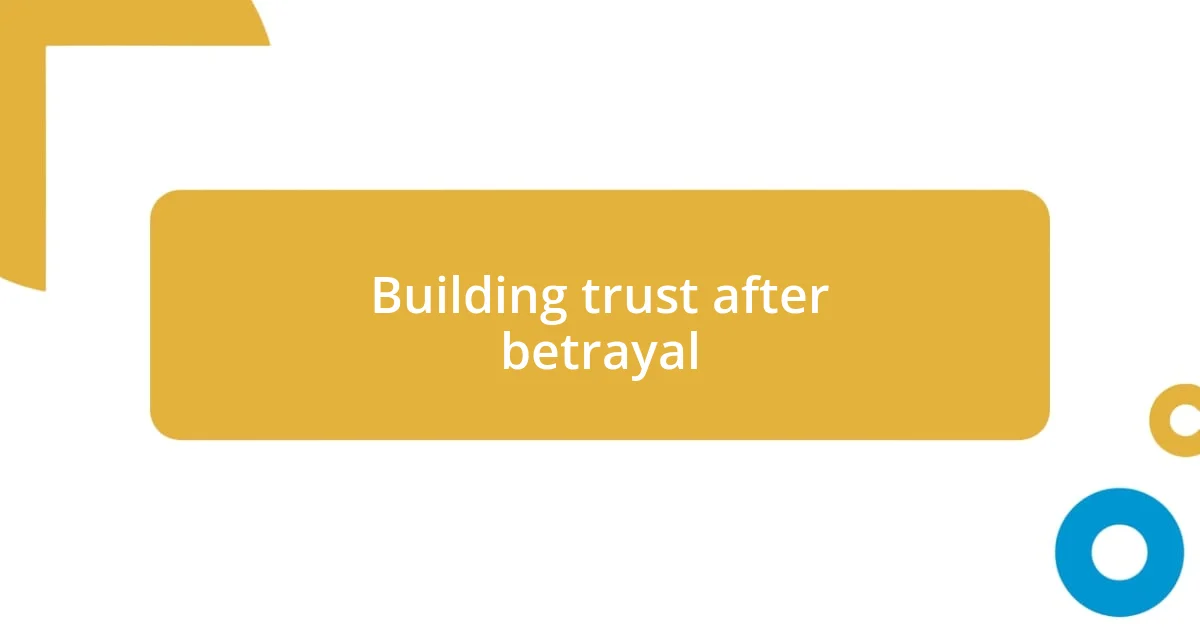
Building trust after betrayal
Building trust after betrayal isn’t easy, but it’s a necessary step for moving forward. I recall a time when I hesitated to open up again, fearing a shadow of doubt would linger in my heart. It was like standing at the edge of a swimming pool, contemplating whether to dive back into the water. Have you ever found yourself in a similar position? I realized that building trust begins with vulnerability, allowing myself to be seen, imperfections and all.
Making the effort to communicate openly became my guiding principle. I once engaged in deep conversations with a close friend who had also experienced betrayal. We shared our fears and hopes, gradually rebuilding a sense of trust that felt authentic. This experience reinforced my belief that transparency is crucial; it creates a safe space for honesty. How might a simple conversation reshape your relationships? I’ve seen the power of dialogue transform uncertainty into security.
Another key aspect of rebuilding trust is patience, both with yourself and others. I vividly remember a moment when I felt frustrated, wanting everything to return to normal overnight. But each small step I took, whether it was setting boundaries or expressing my needs, helped lay the foundation for stronger connections moving forward. It’s about recognizing that trust is rebuilt over time, like nurturing a delicate plant. Have you given yourself the grace to foster those bonds? For me, the process has been rewarding, gradually turning my wounds into wisdom.
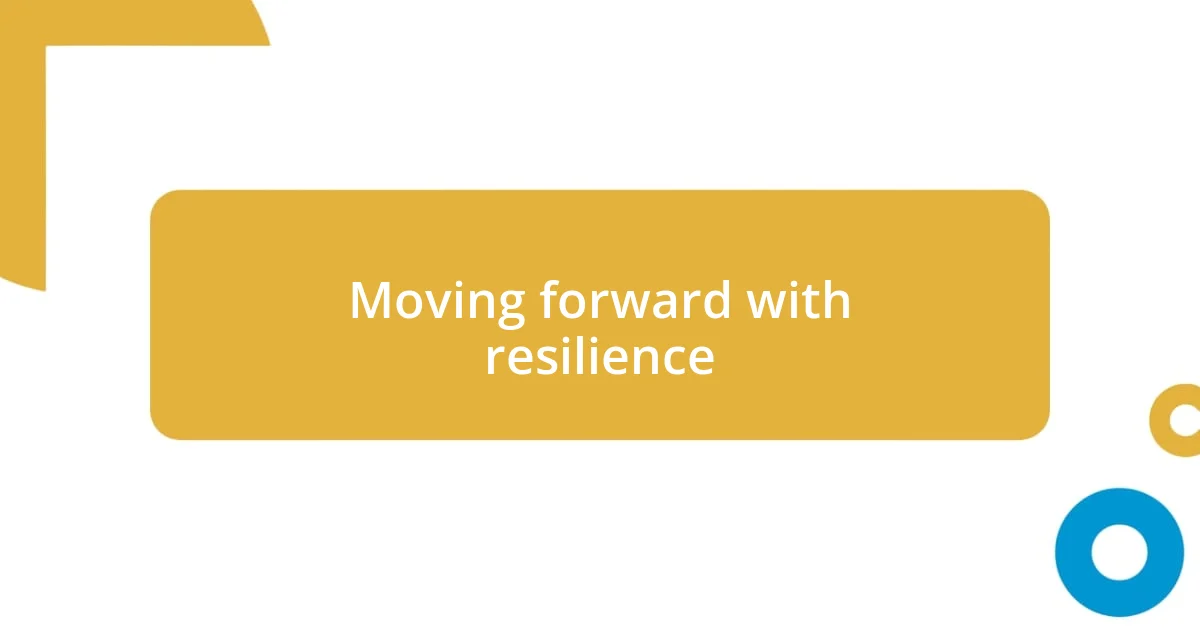
Moving forward with resilience
Resilience, I’ve learned, is like a muscle that grows stronger with use. After experiencing betrayal, I felt battered and bruised, yet I compelled myself to get up each day, finding solace in simple routines. Have you ever noticed how the smallest actions can lead to a sense of normalcy? I found joy in things like a morning jog or tending to my garden, reminding myself that life continues beyond the shadows of past hurts.
There were days when my resilience was tested, feeling like I was trudging through thick mud. I remember one evening when self-doubt crept in, and it seemed easier to succumb to the negativity. But instead of giving in, I took a moment to reflect. I asked myself what I could learn from this experience and how those lessons could guide my steps forward. Each time I reframed my thoughts, I felt a little lighter, as if I were shedding the weight of my past—have you found a mantra or a question that helps lift your spirits?
Developing resilience also involved surrounding myself with the right support. I reached out to friends who offered both encouragement and a listening ear. Their presence reminded me that I wasn’t alone in this; together, we navigated the treacherous waters of betrayal. Have you ever felt the power of community? It’s profound when you realize that sharing your struggles can forge deeper connections and create a collective strength that carries you through life’s storms.
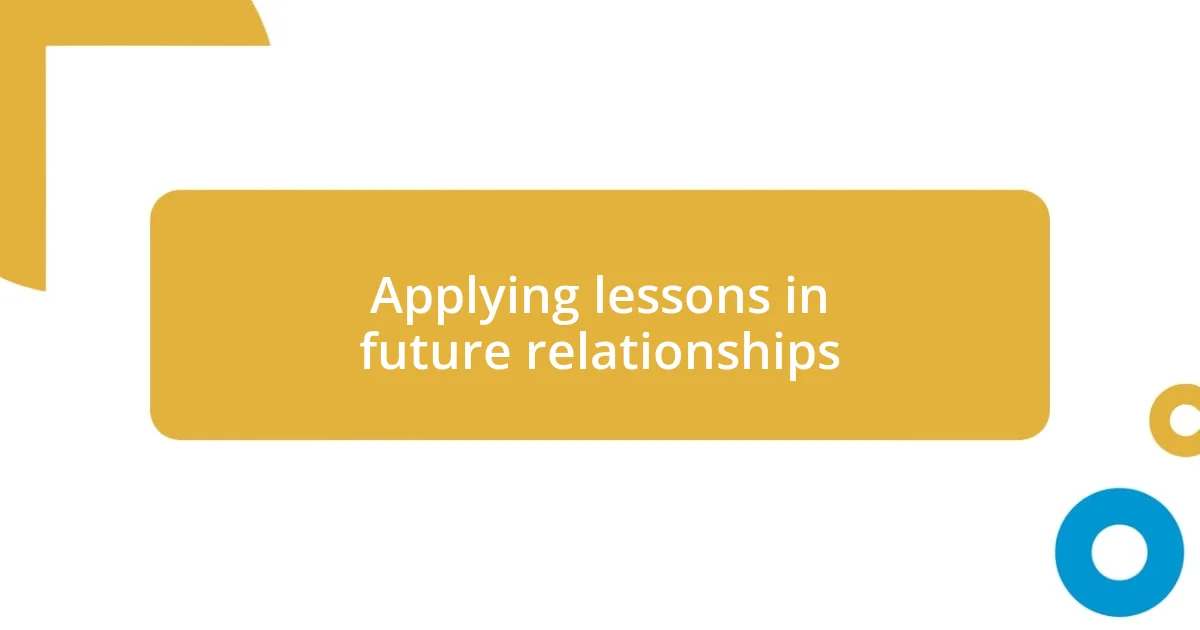
Applying lessons in future relationships
I’ve discovered that applying the lessons learned from betrayal means setting clearer boundaries in future relationships. One time, I found myself in a situation where my generosity was met with disregard. This pushed me to articulate my limits more openly. I began to ask myself: How can I protect my heart while still being approachable? By establishing boundaries, I felt empowered rather than fearful, creating healthier dynamics with those around me.
Another vital lesson was the importance of discerning trust. Reflecting on past experiences, I remember embracing people with similar openness, only to be blind to some red flags. I asked myself: What subtle signals did I overlook? I realized that trust mustn’t be handed out freely; it should be earned through consistent actions over time. This shift in perspective has made me more perceptive, allowing me to build stronger connections grounded in genuine respect.

